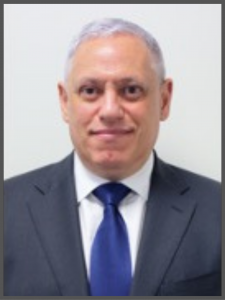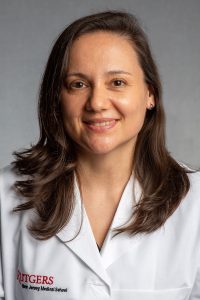PI Profiles
 Renata Pasqualini, PhD, is a professor of medicine and Chief of the Division of Cancer Biology at CINJ/Rutgers University. Dr. Pasqualini received her PhD degree from the Ludwig Institute for Cancer Research and did postdoctoral training at Harvard Medical School and at the Burnham Institute in La Jolla, CA. Together with Dr. Wadih Arap, with whom she leads a joint laboratory, she made groundbreaking discoveries about the diversity of blood vessels in normal and diseased organs, developing a system to identify different molecular signatures based on where they are located in the body. These so-called “vascular ZIP codes” may be used to selectively deliver therapeutic and diagnostic agents in diseases such as cancer, obesity, and blinding eye disorders. In addition to her activities as the principal investigator and head of a large research laboratory, first at the University of Texas M.D. Anderson Cancer Center and now at Rutgers University, she serves as a board member, reviewer, and chair in multiple review panels for the National Institutes of Health, the Department of Defense, along with several other American, Asian, and European Foundations that support basic and clinical research. She is a Referee for several top journals featuring cutting edge research and technology, has published more than 200 papers, and holds multiple patents.
Renata Pasqualini, PhD, is a professor of medicine and Chief of the Division of Cancer Biology at CINJ/Rutgers University. Dr. Pasqualini received her PhD degree from the Ludwig Institute for Cancer Research and did postdoctoral training at Harvard Medical School and at the Burnham Institute in La Jolla, CA. Together with Dr. Wadih Arap, with whom she leads a joint laboratory, she made groundbreaking discoveries about the diversity of blood vessels in normal and diseased organs, developing a system to identify different molecular signatures based on where they are located in the body. These so-called “vascular ZIP codes” may be used to selectively deliver therapeutic and diagnostic agents in diseases such as cancer, obesity, and blinding eye disorders. In addition to her activities as the principal investigator and head of a large research laboratory, first at the University of Texas M.D. Anderson Cancer Center and now at Rutgers University, she serves as a board member, reviewer, and chair in multiple review panels for the National Institutes of Health, the Department of Defense, along with several other American, Asian, and European Foundations that support basic and clinical research. She is a Referee for several top journals featuring cutting edge research and technology, has published more than 200 papers, and holds multiple patents.
 Dr. Wadih Arap received his M.D. degree from the University of São Paulo Medical School and his Ph.D. degree in Cancer Biology from Stanford University. Dr. Arap trained in medical oncology and hematology as a fellow at Memorial Sloan Kettering Cancer Center. His thesis work was completed at the Ludwig Institute for Cancer Research. He eventually joined M.D. Anderson Cancer Center and, leading a joint laboratory with Dr. Pasqualini, co-developed and optimized vascular-targeted therapies, which included serial selection of tissue- or disease-specific ZIP codes in patients to enable rapid clinical translation of novel therapeutics. Given his extensive training as a physician-scientist, in addition to running a joint laboratory with Dr. Pasqualini, Dr. Arap also serves as Director of Rutgers Cancer Institute of New Jersey at University Hospital and treats patients in a practice there. He also serves on grant review boards for NIH programs, the U.S. Department of Defense (Prostate Cancer Research Program), and several international funding agencies. His current interests include the translation of biotechnologies derived from exploring the molecular diversity of disease into clinical applications and the development of novel therapeutic strategies.
Dr. Wadih Arap received his M.D. degree from the University of São Paulo Medical School and his Ph.D. degree in Cancer Biology from Stanford University. Dr. Arap trained in medical oncology and hematology as a fellow at Memorial Sloan Kettering Cancer Center. His thesis work was completed at the Ludwig Institute for Cancer Research. He eventually joined M.D. Anderson Cancer Center and, leading a joint laboratory with Dr. Pasqualini, co-developed and optimized vascular-targeted therapies, which included serial selection of tissue- or disease-specific ZIP codes in patients to enable rapid clinical translation of novel therapeutics. Given his extensive training as a physician-scientist, in addition to running a joint laboratory with Dr. Pasqualini, Dr. Arap also serves as Director of Rutgers Cancer Institute of New Jersey at University Hospital and treats patients in a practice there. He also serves on grant review boards for NIH programs, the U.S. Department of Defense (Prostate Cancer Research Program), and several international funding agencies. His current interests include the translation of biotechnologies derived from exploring the molecular diversity of disease into clinical applications and the development of novel therapeutic strategies.
 Dr. Staquicini earned her Ph.D. in Microbiology and Immunology from the Federal University of São Paulo in Brazil. She completed her postdoctoral research training at the University of Texas M.D. Anderson Cancer Center and University of New Mexico Comprehensive Cancer Center. She was mentored by Dr. Renata Pasqualini and Dr. Wadih Arap, renowned pioneers in the field of phage display technology for translational applications in cancer biology and drug development. Dr. Staquicini’s research focuses on the application of phage display to identify receptor-guided transport pathways for the safe delivery of particles, agents, and vaccines through the lung alveolar surface. She has published three articles in this field including two peer-reviewed articles in high-impact journals related to the development of vaccine candidates for COVID-19. The work resulted in two patents licensed to biotechnology companies for further development. She has also achieved success in publishing original peer-reviewed manuscripts on molecular theranostics, targeted drug development, and molecular parasitology. In addition to her independent projects, she has a long-standing collaborative program with Dr. Pasqualini and Dr. Arap in pulmonary delivery, vaccine development, and ligand-directed drug delivery and imaging for the management of human diseases. Dr. Staquicini mentors graduate students, staff, and postdoctoral trainees in the Department of Radiation Oncology.
Dr. Staquicini earned her Ph.D. in Microbiology and Immunology from the Federal University of São Paulo in Brazil. She completed her postdoctoral research training at the University of Texas M.D. Anderson Cancer Center and University of New Mexico Comprehensive Cancer Center. She was mentored by Dr. Renata Pasqualini and Dr. Wadih Arap, renowned pioneers in the field of phage display technology for translational applications in cancer biology and drug development. Dr. Staquicini’s research focuses on the application of phage display to identify receptor-guided transport pathways for the safe delivery of particles, agents, and vaccines through the lung alveolar surface. She has published three articles in this field including two peer-reviewed articles in high-impact journals related to the development of vaccine candidates for COVID-19. The work resulted in two patents licensed to biotechnology companies for further development. She has also achieved success in publishing original peer-reviewed manuscripts on molecular theranostics, targeted drug development, and molecular parasitology. In addition to her independent projects, she has a long-standing collaborative program with Dr. Pasqualini and Dr. Arap in pulmonary delivery, vaccine development, and ligand-directed drug delivery and imaging for the management of human diseases. Dr. Staquicini mentors graduate students, staff, and postdoctoral trainees in the Department of Radiation Oncology.